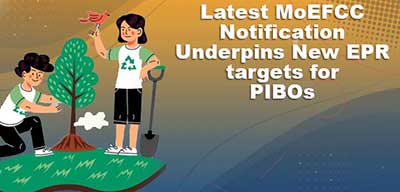Relevance: GS-3: Conservation, Environmental Pollution and Degradation, Environmental Impact Assessment
Key Phrases: EPR, SUP, new Plastic Waste Management (Amendment) Rules, 2022, end-of-life disposal, CIPET, NEERI
Why in News?
- The Environment Ministry has notified comprehensive guidelines on Extended Producer Responsibility (EPR) for plastic packaging.
- This would be instrumental in achieving the target to eliminate single-use plastics (SUP)
Key Highlights of the article
- The notification of the new Plastic Waste Management (Amendment) Rules, 2022 would provide a framework to strengthen the circular economy of plastic packaging waste and promote alternatives to plastic.
- This is in line with the clarion call given by our PM to eliminate SUPs which have “low utility and high littering potential”
- According to the notification, the new guidelines shall come into force with immediate effect.
- The new rules classify plastics into four categories-
- Category 1 will include rigid plastic packaging;
- Category 2 will include
- Flexible plastic packaging of single layer or
- Multilayer (more than one layer with different types of plastic),
- Plastic sheets and covers made of plastic sheet,
- Carry bags,
- Plastic sachet or pouches.
- Category 3 will include Multi-layered plastic packaging (at least one layer of plastic and at least one layer of material other than plastic)
- Category 4 will include plastic sheet or like used for packaging as well as carry bags made of compostable plastics
- With respect to plastic packaging,
- The EPR covers reuse, recycling, use of recycled plastic content and end of life disposal by producers, importers and brand-owners.
- According to the new rules, the producers, importers and brand-owners
shall have to provide the details of recycling certificates only from
registered recyclers along with the details of quantity sent for end-of-life
disposal, by June 30 of next financial year while filing annual returns on
the online portal.
- These details provided by producers, importers and brand-owners and registered plastic waste processors will be further cross-checked by the online portal
- In case of difference, the lower figure would be considered towards fulfilment of EPR obligation of producers, importers and brand-owners.
- The recycling certificates shall be subject to verification by Central Pollution Control Board or State Pollution Control Board (SPCB) or Pollution Control Committee (PCC).
- The government has also called for establishing of a centralised online
portal by Central Pollution Control Board (CPCB) for the registration as
well as filing of annual returns by producers, importers and brand-owners,
plastic waste processors of plastic packaging waste by March 31.
- The online system developed by CPCB for the registration as well as for filing of returns by producers, importers and brand-owners shall reflect the plastic packaging material introduced in the market by them in a financial year.
- It shall also reflect the details regarding the audit of the producers, importers and brand-owners as well as recyclers or other waste processors of plastic packaging waste.
- The centralised portal would act as the single point data repository with respect to orders and guidelines related to implementation of EPR for plastic packaging under Plastic Waste Management Rule, 2016.
- Environmental compensation shall be levied based upon polluter
pays principle, with respect to non-fulfilment of EPR targets by producers,
importers and brand owners, for the purpose of
- Protecting and improving the quality of the environment and
- Preventing, controlling and abating environment pollution
- No absolution
- Payment of environmental compensation shall not absolve the producers, importers and brand owners of the obligations set out in these guidelines.
- The unfulfilled EPR obligations for a particular year will be carried forward to the next year for a period of three years
- A committee shall be constituted by the CPCB under the
chairmanship of CPCB chairman, to recommend measures to the environment
ministry for effective implementation of EPR, including amendments to
Extended Producer Responsibility (EPR) guidelines.
- It will also take such measures as required for removal of difficulties in implementation of guidelines.
- It shall also be tasked with the guiding and supervision of the online portal, including approval of requisite forms or pro forma
- The committee shall comprise representatives from concerned
Ministries/Departments such as
- Ministry of Housing and Urban Affairs,
- Ministry of Micro, Small and Medium Enterprises,
- Department of Drinking Water and Sanitation,
- Department of Chemical and Petrochemicals;
- Bureau of Indian Standards,
- Three State Pollution Control Boards or Pollution Control Committees,
- Central Institute of Plastic Engineering and Technology (CIPET),
- National Environmental Engineering Research Institute (NEERI), and
- Three industry associations, and any other invitee as decided by the chairperson of the committee.
- Under the new guidelines, SPCBs or PCCs shall submit an annual report on EPR portal with respect to its fulfilment by producers, importers and brand-owners (which include manufacturers of plastic packaging material) and plastic waste processors in the state/Union Territory to the CPCB.
- The report shall also be submitted to the state-level monitoring committee constituted under the Plastic Waste Management Rules, 2016.
- The SPCB or PCC shall also submit an annual report with respect to recyclers or end of life disposal in the state or UT to the CPCB by July 31 of next year.

Strategy for Plastic Waste Management (Source)
Way Forward
- UN Environment has drawn up a 10-step roadmap for governments to guide them to eliminated SUPs and reduce their impact on the environment
- Plastic Credit Mechanism could be adopted
- Establishing a market where EPR mechanism can be implemented with ease
- Adoption of Circular economy
Source: The Hindu
Mains Question:
Q. Mention the new guidelines on Extended Producer Responsibility framed under Plastic Waste Management Rules. Also discuss its potential to solve the crisis of Single Use Plastics.









